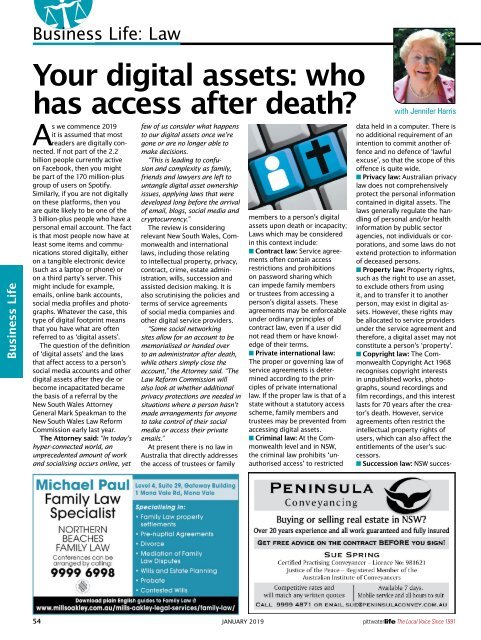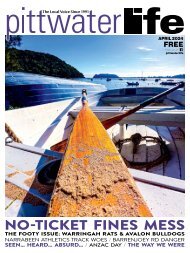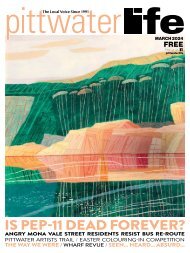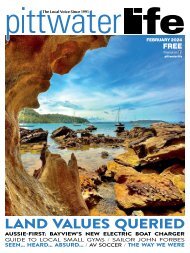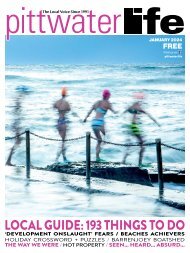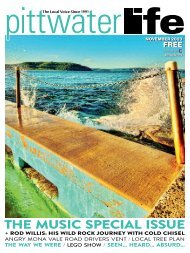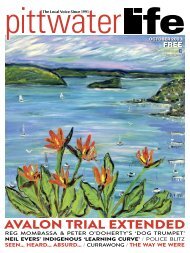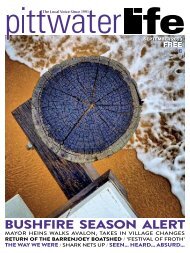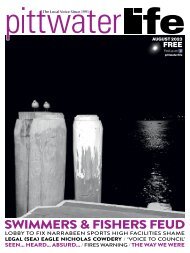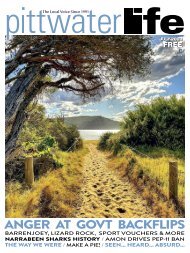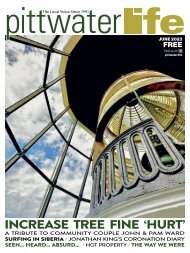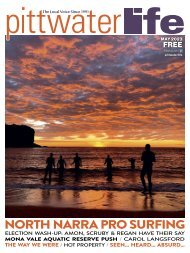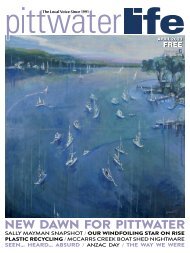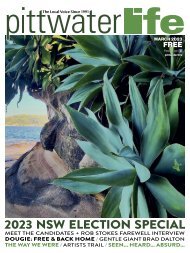Pittwater Life January 2019 Issue
Locals' Guide - 143 Things You Can Do (at the very least). So Are You Ready To Rock? 'Lifegift' Free Trial.
Locals' Guide - 143 Things You Can Do (at the very least). So Are You Ready To Rock? 'Lifegift' Free Trial.
Create successful ePaper yourself
Turn your PDF publications into a flip-book with our unique Google optimized e-Paper software.
Business <strong>Life</strong>: Law<br />
Business <strong>Life</strong><br />
Your digital assets: who<br />
has access after death?<br />
As we commence <strong>2019</strong><br />
it is assumed that most<br />
readers are digitally connected.<br />
If not part of the 2.2<br />
billion people currently active<br />
on Facebook, then you might<br />
be part of the 170 million-plus<br />
group of users on Spotify.<br />
Similarly, if you are not digitally<br />
on these platforms, then you<br />
are quite likely to be one of the<br />
3 billion-plus people who have a<br />
personal email account. The fact<br />
is that most people now have at<br />
least some items and communications<br />
stored digitally, either<br />
on a tangible electronic device<br />
(such as a laptop or phone) or<br />
on a third party’s server. This<br />
might include for example,<br />
emails, online bank accounts,<br />
social media profiles and photographs.<br />
Whatever the case, this<br />
type of digital footprint means<br />
that you have what are often<br />
referred to as ‘digital assets’.<br />
The question of the definition<br />
of ‘digital assets’ and the laws<br />
that affect access to a person’s<br />
social media accounts and other<br />
digital assets after they die or<br />
become incapacitated became<br />
the basis of a referral by the<br />
New South Wales Attorney<br />
General Mark Speakman to the<br />
New South Wales Law Reform<br />
Commission early last year.<br />
The Attorney said: “In today’s<br />
hyper-connected world, an<br />
unprecedented amount of work<br />
and socialising occurs online, yet<br />
data held in a computer. There is<br />
no additional requirement of an<br />
intention to commit another offence<br />
and no defence of ‘lawful<br />
excuse’, so that the scope of this<br />
offence is quite wide.<br />
n Privacy law: Australian privacy<br />
law does not comprehensively<br />
protect the personal information<br />
contained in digital assets. The<br />
laws generally regulate the handling<br />
of personal and/or health<br />
information by public sector<br />
agencies, not individuals or corporations,<br />
and some laws do not<br />
extend protection to information<br />
of deceased persons.<br />
n Property law: Property rights,<br />
such as the right to use an asset,<br />
to exclude others from using<br />
it, and to transfer it to another<br />
person, may exist in digital assets.<br />
However, these rights may<br />
be allocated to service providers<br />
under the service agreement and<br />
therefore, a digital asset may not<br />
constitute a person’s ‘property’.<br />
n Copyright law: The Commonwealth<br />
Copyright Act 1968<br />
recognises copyright interests<br />
in unpublished works, photographs,<br />
sound recordings and<br />
film recordings, and this interest<br />
lasts for 70 years after the creator’s<br />
death. However, service<br />
agreements often restrict the<br />
intellectual property rights of<br />
users, which can also affect the<br />
entitlements of the user’s successors.<br />
n Succession law: NSW succesfew<br />
of us consider what happens<br />
to our digital assets once we’re<br />
gone or are no longer able to<br />
make decisions.<br />
“This is leading to confusion<br />
and complexity as family,<br />
friends and lawyers are left to<br />
untangle digital asset ownership<br />
issues, applying laws that were<br />
developed long before the arrival<br />
of email, blogs, social media and<br />
cryptocurrency.”<br />
The review is considering<br />
relevant New South Wales, Commonwealth<br />
and international<br />
laws, including those relating<br />
to intellectual property, privacy,<br />
contract, crime, estate administration,<br />
wills, succession and<br />
assisted decision making. It is<br />
also scrutinising the policies and<br />
terms of service agreements<br />
of social media companies and<br />
other digital service providers.<br />
“Some social networking<br />
sites allow for an account to be<br />
memorialised or handed over<br />
to an administrator after death,<br />
while others simply close the<br />
account,” the Attorney said. “The<br />
Law Reform Commission will<br />
also look at whether additional<br />
privacy protections are needed in<br />
situations where a person hasn’t<br />
made arrangements for anyone<br />
to take control of their social<br />
media or access their private<br />
emails.”<br />
At present there is no law in<br />
Australia that directly addresses<br />
the access of trustees or family<br />
members to a person’s digital<br />
assets upon death or incapacity;<br />
Laws which may be considered<br />
in this context include:<br />
n Contract law: Service agreements<br />
often contain access<br />
restrictions and prohibitions<br />
on password sharing which<br />
can impede family members<br />
or trustees from accessing a<br />
person’s digital assets. These<br />
agreements may be enforceable<br />
under ordinary principles of<br />
contract law, even if a user did<br />
not read them or have knowledge<br />
of their terms.<br />
n Private international law:<br />
The proper or governing law of<br />
service agreements is determined<br />
according to the principles<br />
of private international<br />
law. If the proper law is that of a<br />
state without a statutory access<br />
scheme, family members and<br />
trustees may be prevented from<br />
accessing digital assets.<br />
n Criminal law: At the Commonwealth<br />
level and in NSW,<br />
the criminal law prohibits ‘unauthorised<br />
access’ to restricted<br />
with Jennifer Harris<br />
54 JANUARY <strong>2019</strong><br />
The Local Voice Since 1991


